|
|
|
Sort Order |
|
|
|
Items / Page
|
|
|
|
|
|
|
| Srl | Item |
| 1 |
ID:
124210
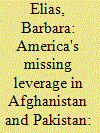

|
|
|
|
|
| Publication |
2013.
|
| Summary/Abstract |
Despite strong shared interests and their dependence on US assistance, Kabul and Islamabad frequently fail to cooperate with the USA's post-9/11 security agenda. Why doesn't the USA have more leverage in these alliances and what can it change to be more influential? This article identifies four structural factors in Washington's alliances in Afghanistan and Pakistan ('Af-Pak') contributing to Washington's lack of coercive power: 1) the USA's interest makes coercion difficult; 2) Kabul and Islamabad have more invested and will bargain to protect their interests; 3) the form of US commitment (an intense but explicitly temporary military commitment) produces incentives for Kabul and Islamabad to adopt short-term solutions, frequently running against US interests; and 4) the tenets of counterinsurgency policy cause Washington to be politically dependent on Kabul and Islamabad, effectively reducing its influence.
|
|
|
|
|
|
|
|
|
|
|
|
|
|
|
|
| 2 |
ID:
124204
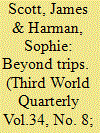

|
|
|
|
|
| Publication |
2013.
|
| Summary/Abstract |
The current round of World Trade Organization (WTO) negotiations-the Doha Round-has significant implications for global health which have received insufficient attention from the global health community. All too often the health implications of global trade agreements are examined only after their conclusion, and are concerned only with intellectual property rights. This paper seeks to move beyond this narrow focus and elucidate the wider health implications of the Doha Round. It explores the negative effect of the Round on state capacity to provide and regulate health services in low-income countries, and the impact it will have on livelihoods among the poor and their ability to access health services. Overall the paper makes the case for greater engagement from the health community with the wto and the Doha Round negotiations beyond the customary focus on intellectual property rights.
|
|
|
|
|
|
|
|
|
|
|
|
|
|
|
|
| 3 |
ID:
124212
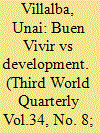

|
|
|
|
|
| Publication |
2013.
|
| Summary/Abstract |
The concept of development and the ways of achieving it have been widely criticised from various viewpoints. In the face of the apparent obsolescence of long-standing models, the novel Buen Vivir approach (roughly translated as 'living well' or 'good living'), which has arisen in different parts of Latin America, may offer an alternative paradigm. However, the implementation of policies that could lead to this Buen Vivir model requires profound changes that follow a range of complex transitions, which may often even seem contradictory in countries like Ecuador, where this approach has already been enacted in the new constitution and laws but where old development practices still continue. Accepting the plurality of visions on Buen Vivir (from the indigenous ontology to the 'Western-modern' approach), while at the same time positing common ground in which to define a new development strategy able to overcome a natural resource extraction-based economic pattern, is one of the immediate challenges.
|
|
|
|
|
|
|
|
|
|
|
|
|
|
|
|
| 4 |
ID:
124217


|
|
|
|
|
| Publication |
2013.
|
| Summary/Abstract |
Debt is fundamentally an issue of power; the transfer of resources between debtor and creditor, and the decisions a creditor can force on a debtor. The Jubilee movement for 'Third World' debt cancellation got its name from the Jewish scriptures. A 'jubilee' was a time when debts were cancelled, slaves freed, land returned and fields left fallow. All these were linked. Those working on the land got into debt when harvests failed. To feed their families they borrowed from neighbours. As debts rose and families became unable to pay, they had to sell off their land. Rent was charged on the sold land, creditors got richer, debtors poorer, and debts increased. Now when struggling to pay, debtors sold off what was left to them: daughters, sons and themselves. Many ended up in slavery. Jubilee was a time to stop and put right these wrongs. It addressed both the debt and other inequalities of power and resources which arose in the name of debt.
|
|
|
|
|
|
|
|
|
|
|
|
|
|
|
|
| 5 |
ID:
124209
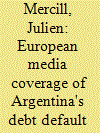

|
|
|
|
|
| Publication |
2013.
|
| Summary/Abstract |
In 2001 Argentina defaulted on its debts and then devalued its currency by abandoning the peso-dollar peg. The economy rebounded and has grown relatively strongly since then. This paper uses a critical political economy approach to first show that the Argentinian strategy finds support in the literature examining the effects of sovereign debt default, currency devaluation and fiscal consolidation on economic growth. Argentina is thus relevant to Europe's ongoing crisis. The article then investigates European media coverage of the Argentinian experience through an examination of major newspapers' stories between 2008 and 2013. It argues that the media have distorted the lessons of the Argentinian recovery by focusing on the negative consequences of default rather than its benefits; by emphasising the role of rising commodity export prices over domestic policy decisions in stimulating the economy; by opposing some aspects of government intervention in the economy even if the latter played a beneficial role; and by exaggerating the negative consequences of inflation. This distorted coverage is explained through reference to the media's ideological role in the implementation of austerity policies in Europe.
|
|
|
|
|
|
|
|
|
|
|
|
|
|
|
|
| 6 |
ID:
124218
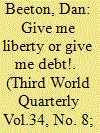

|
|
|
|
|
| Publication |
2013.
|
| Summary/Abstract |
Alexis Tsipras, the leader of [Greece's] opposition Syriza party, said last week that his country was becoming a 'debt colony'. A couple of days later, Hernán Lorenzino, Argentina's economy minister, used the term 'judicial colonialism' to denounce the US court ruling that his country has to pay in full a group of 'vulture funds' that had held out from the debt restructuring that followed the country's 2002 default.
|
|
|
|
|
|
|
|
|
|
|
|
|
|
|
|
| 7 |
ID:
124177
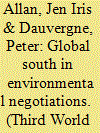

|
|
|
|
|
| Publication |
2013.
|
| Summary/Abstract |
During international environmental negotiations developing countries have commonly employed a unified strategy through the G-77 and China (G-77/China). Compared with other negotiations, such as those on trade and security, this strategy has been relatively successful in securing financial and technical benefits. Unity among developing states is not, however, a characteristic of all environmental negotiations. This paper analyses the case of Reducing Emissions from Deforestation and Degradation plus conservation ( redd +), where unity has been absent. It argues that the negotiation positions, strategies and coalition politics from 2005 to 2013 have been a result of identifiable power asymmetries among developing states (shifting over time). Some states with vast forest resources have held an effective veto, while others have had considerable moral influence and expert authority. Coalitions have courted such relevant and reputational leaders. At the same time some developing states have had enough diplomatic capacity and economic power to stand alone in negotiations. Taking a broad, historical view of the diverse forest interests and power asymmetries among developing states helps to explain the recent stagnation in negotiations to establish an international redd+ mechanism to mitigate climate change.
|
|
|
|
|
|
|
|
|
|
|
|
|
|
|
|
| 8 |
ID:
124213
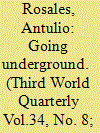

|
|
|
|
|
| Publication |
2013.
|
| Summary/Abstract |
This article argues that South America's 'revolutionary' left turn can be best explained by its assertion of state property over natural resource extraction. The recent history of the leftist movements in Venezuela, Bolivia and Ecuador relates to the failures of the neoliberal reforms applied in the region decades before, hence the dismantling of core orthodox policies has been critical for them once in power. This has been possible through the expansion of state action in the economy, but mainly through the governance of hydrocarbon extraction and the control of subsoil rents. Resource extraction has been central to the political economy of Andean left-wing revolutionaries, responsible for many of their successes but also their impending challenges. This rearticulation of underground governance is linked to global transformations that give prominence to emerging economies and reinforces these countries' position in the world economy as providers of primary commodities.
|
|
|
|
|
|
|
|
|
|
|
|
|
|
|
|
| 9 |
ID:
124220
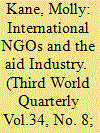

|
|
|
|
|
| Publication |
2013.
|
| Summary/Abstract |
The Make Poverty History campaign, launched in 2005, mobilised citizens to press their governments at key moments throughout the year to take action to eliminate global poverty. Initiated and ?nanced by international development NGOs (INGOs), the campaign appealed to a broad constituency, building unity
around three demands: more and better aid, debt cancellation and trade justice. The call for solidarity and economic justice resonated with millions of people, who added their names to a 'virtual' coalition via internet petitions and public demonstrations around the world.
|
|
|
|
|
|
|
|
|
|
|
|
|
|
|
|
| 10 |
ID:
124216
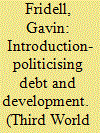

|
|
|
|
|
| Publication |
2013.
|
| Summary/Abstract |
In contrast to mainstream development economists' and policy makers' insistence that relatively straightforward, technical and apolitical solutions exist to the problems of debt and development, debt is inscribed in powerful, unequal and contested structures and relations. This is vividly depicted in the articles in this special section, written by activists and researchers with years of experience mobilising and supporting grassroots struggles, which reveal the often obscure or unspoken relations of power that underpin the highly unequal dynamics of debt on a global scale, while promoting and offering fresh insights from a diverse array of new initiatives and subversive tactics that confront the dominant debt and development paradigm. They offer sober reflection on what organisations need to do to get things done in continuing and future battles for debt justice.
|
|
|
|
|
|
|
|
|
|
|
|
|
|
|
|
| 11 |
ID:
124219
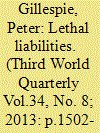

|
|
|
|
|
| Publication |
2013.
|
| Summary/Abstract |
In the mid-1980s I had the opportunity to work with the National Federation of Sugar Workers, the union of sugar plantation workers in the Philippines. It was a desperate period in Negros Occidental, the main sugar-producing island. Sugar prices had fallen worldwide. The end of a preferential trade agreement with the USA had resulted in a dramatic decline of sugar exports to the American market. The economy of Negros had collapsed. Starvation among workers and their families was setting in .
|
|
|
|
|
|
|
|
|
|
|
|
|
|
|
|
| 12 |
ID:
124215


|
|
|
|
|
| Publication |
2013.
|
| Summary/Abstract |
Over the past 10 years Northern aid agencies have made a concerted effort to participate in South-South cooperation. This article analyses the key modes and motivations behind this growing engagement, looking specifically at three areas: multilateral platforms, triangular cooperation and knowledge production about South-South cooperation. Across all these efforts we perceive a concerted attempt to gain legitimacy by emphasising horizontality in the co-construction of knowledge about development. We argue that, within a context of shrinking Northern aid, this engagement is a way to harness South-South cooperation in order to preserve and expand Northern influence, both within and outside the field of development cooperation. This interpretation suggests the need to further examine the 'bridging' initiatives and mutual impact of intersection points between Northern aid and South-South cooperation.
|
|
|
|
|
|
|
|
|
|
|
|
|
|
|
|
| 13 |
ID:
124189
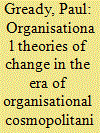

|
|
|
|
|
| Publication |
2013.
|
| Summary/Abstract |
This article argues that organisational cosmopolitanism is an increasingly common characteristic of international ngos. Cosmopolitanism goes beyond international staffing, to include multi-sectoral mandates, multiple skill sets and multiple levels of working. It also challenges the orthodoxies of its parent discourses. Change within such international ngos represents a new frontier in organisational change, as its ambit and ambition extends beyond the demands of more conventional intra-sectoral change. Using ActionAid as a case study, the article explores what might be gained by rendering explicit previously implicit theories of change within such a context. It focuses on inward looking, organisational change but also explores connections to outward looking, operational change. The article highlights two change-related concepts that are of relevance to cosmopolitan organisations: organisational archaeologies (implying layered, hybrid, evolutionary change) and cycles of misalignment followed by realignment. Lessons learned for cosmopolitan organisations from the ActionAid case study suggest that cycles of internal reflection and planning are an effective way of managing other aspects of change.
|
|
|
|
|
|
|
|
|
|
|
|
|
|
|
|
| 14 |
ID:
124181
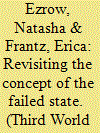

|
|
|
|
|
| Publication |
2013.
|
| Summary/Abstract |
The policy and donor communities have placed great importance on fixing 'failed states'. World leaders have cited failed states as one of the greatest threats to the global community. Nevertheless the concept of the failed state is currently subject to a backlash from the academic community. Scholars have criticised the failed states literature on theoretical, normative, empirical and practical grounds. We provide a brief overview of these main concerns and offer a more systematic method for measuring 'state failure'. Coming up with better ways of assessing how states underperform will enhance our understanding of how institutional decay affects stability and development and, most importantly, will provide an improved system of early warning for practitioners.
|
|
|
|
|
|
|
|
|
|
|
|
|
|
|
|
| 15 |
ID:
124211
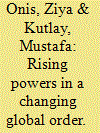

|
|
|
|
|
| Publication |
2013.
|
| Summary/Abstract |
The rise of bric s presents a major challenge to the existing global order. A second category of emerging powers, which may be labelled near- bric s, have also displayed increasing pro-activism in recent years in terms of influencing the regional balance of power politics, in addition to their growing presence in international organisations and global affairs. It is in this context that we aim to examine Turkey as a striking example of a 'near- bric ' power, a country that has adopted an increasingly assertive and independent style of foreign policy with aspirations to establish itself as a major regional actor. Using the Turkish experience as a reference point, this paper aims to understand the extent to which near- bric countries possess the economic capacity, sustainable growth performance and soft-power capabilities needed to establish themselves as significant regional and global actors. The recent Turkish experience clearly highlights both the potential and the limits of regional power activism on the part of emerging powers from the 'global South'.
|
|
|
|
|
|
|
|
|
|
|
|
|
|
|
|
| 16 |
ID:
124214
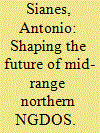

|
|
|
|
|
| Publication |
2013.
|
| Summary/Abstract |
In recent years the financial crisis in traditional donor countries, the aid effectiveness debate and the approaching end of the Millennium Development Goals agenda have opened the door to new goals, instruments and actors in development. This is shaping a new and more complex global aid system. As a consequence, traditional actors like mid-range Northern ngdos (nngdos), born and raised in an oda-based development system, face a challenging scenario. This paper has two aims. First, it aims to summarise the 10 most important challenges nngdos face today. As will be shown, such a complex landscape calls for adaptation, especially if nngdos want to keep playing a key role in the development aid system. The second aim therefore is to present 10 proposals which could help nngdos to overcome these threats, shaping the future this relevant actor could play in the new global aid system.
|
|
|
|
|
|
|
|
|
|
|
|
|
|
|
|
|
|
|
|
|